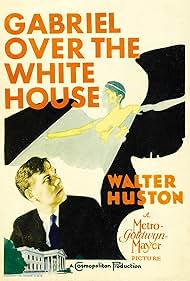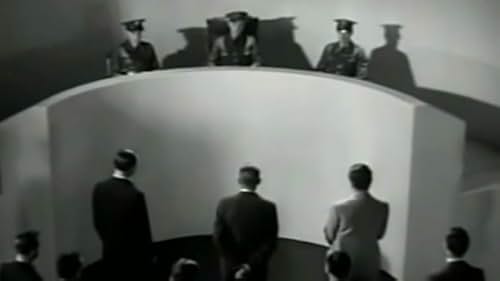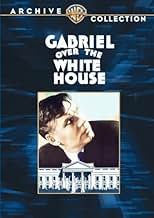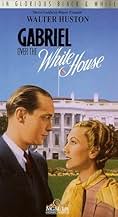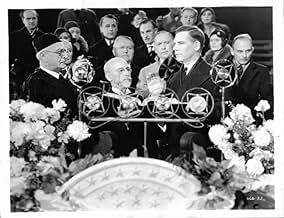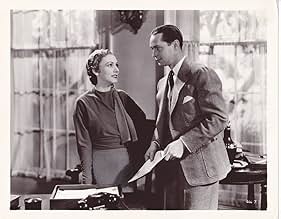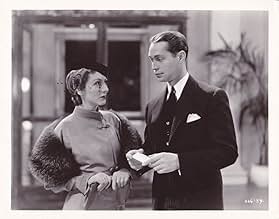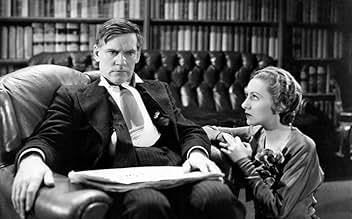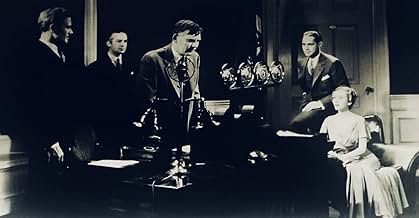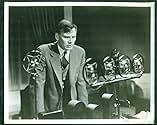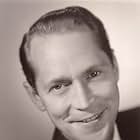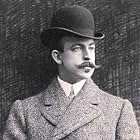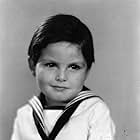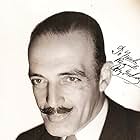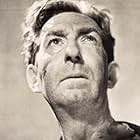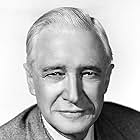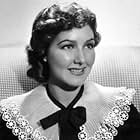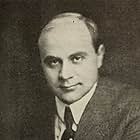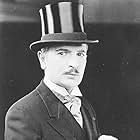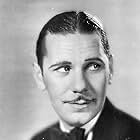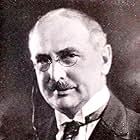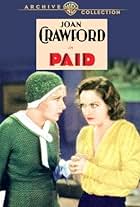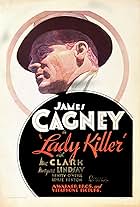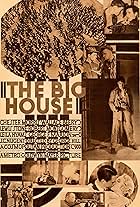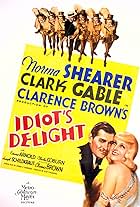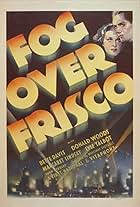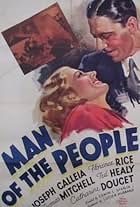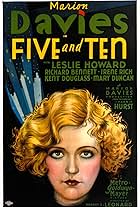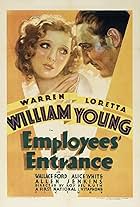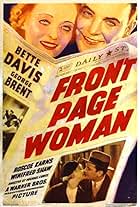AVALIAÇÃO DA IMDb
6,4/10
1,5 mil
SUA AVALIAÇÃO
Adicionar um enredo no seu idiomaA political hack becomes President during the height of the Depression and undergoes a metamorphosis into an incorruptible statesman after a near-fatal accident.A political hack becomes President during the height of the Depression and undergoes a metamorphosis into an incorruptible statesman after a near-fatal accident.A political hack becomes President during the height of the Depression and undergoes a metamorphosis into an incorruptible statesman after a near-fatal accident.
Samuel S. Hinds
- Dr. H.L. Eastman
- (as Samuel Hinds)
Claire Du Brey
- Nurse
- (as Claire DuBrey)
Oscar Apfel
- German Delegate to Debt Conference
- (não creditado)
Mischa Auer
- Mr. Thieson
- (não creditado)
Max Barwyn
- German Officer
- (não creditado)
Jack Baxley
- Unemployed Marcher
- (não creditado)
Brooks Benedict
- White House Press Correspondent
- (não creditado)
Margaret Bert
- Nurse Bert
- (não creditado)
B.F. Blinn
- Politician
- (não creditado)
Enredo
Você sabia?
- CuriosidadesThe protest march of the "army of the unemployed" in the story was no doubt a reference to the protest march of the "Bonus Army" in 1932, where veterans of WWI marched on Congress to demand payment of promised bonuses. They were attacked with tanks and tear gas by the U.S. Army led by Gen. Douglas MacArthur on orders of President Herbert Hoover. William Randolph Hearst, who railed against that action in his newpapers, saw to it that the President in this film helped the people. Meanwhile, Louis B. Mayer, a staunch Republican, delayed the movie until Hoover was out of office.
- Erros de gravaçãoThrough out the whole movie Walter Huston's hair is combed differently in one continuous scene after another. It's obvious many of the cuts back to him are from different takes.
- Citações
Jimmy Vetter: I got a speech.
Hon. Judson Hammond - The President of the United States: A speech? Let's hear it.
Jimmy Vetter: I love my uncle Judd because he's going to cure the Depression and make everybody rich.
- Versões alternativasIn 1995, the Madrid Filmoteca screened both the American version and the little-seen European version of Gabriel Over the White House. In the European version, Hammond is seen to go just that much further into fascism. It also features a significantly altered ending. In the American version, Hammond is nobly struck down at the end, whereas in the European version, Pendie actually chooses NOT to save him, because she sees what he has become.
- ConexõesFeatured in The Great Depression (1993)
- Trilhas sonorasSymphony No. 1 in C minor Op. 68 IV. Adagio
(1876) (uncredited)
Music by Johannes Brahms
A fourth movement theme is played during the opening credits
The same theme is used often as a leitmotif suggesting Archangel Gabriel's presence
Avaliação em destaque
In some way historians can argue that certain figures in our history should have had a chance to become President. Senator Robert Taft deserved an opportunity to show his abilities in that job, as did Senators Henry Clay and Daniel Webster and Robert La Follette. Mistakes, political miscalculations, and sheer chance prevented their elections (and in Taft's case even his nomination). But while there is a general feeling of pity for those four gentlemen in failing to reach the White House, most historians agree that William Randolph Hearst did not fully deserve to even approach it. Hearst was extremely good at building up a newspaper empire, and of creating an exciting and stimulating model for the modern newspaper. But his overwhelming desire to reach the White House became such a joke that he became known as "William - Also Ran - dolph Hearst".
Problem with Hearst was that he enjoyed playing with public opinion and guiding it, but he also enjoyed...well enjoyed living the life of a remarkably wealthy man. His father George Hearst was a prospector who found one of the great gold mines in the west and rose to the post of U.S. Senator from California (ironically, a higher national office than his son ever reached). The image of Hearst from CITIZEN KANE of the boy whose father was a drinker, and whose mother signs over to the boy ownership of the mine is not true. In the course of doing business, Hearst Sr. got ownership of the San Francisco Enquirer, and Willy (who'd been tossed out of several colleges) asked to run it. George allowed Willy to do that, and Willy found his true métier.
His bug to become President never left him. He did win a Congressional seat from New York City in 1901, and held it for two terms. But by then his yellow journalism made so many enemies that he was ignored in Congress (when he decided to show up - he really could not apply himself to the job of Congressman). Yet in 1904 he managed to gather over 200 delegates for the Democratic nomination for the Presidency. Unfortunately he could not get the two thirds majority needed, and the delegates nominated Chief Justice Alton Brooks Parker of New York State's Court of Appeals (who was thrashed by Teddy Roosevelt in the election). Possibly, had Hearst got nominated, it would have enabled him to rid himself of Presidentialitis. That was not to be the case. He would run for Mayor of New York, Governor of New York, and seek a nomination (in the 1920s) for Senator from New York. He never won any of these elections, and he did not get nominated for Senator. His influence in the 1932 Democratic Convention was thrown to FDR, but he subsequently broke with the newly elected 32nd President.
Hearst, in his career, had pushed for better conditions for the poor, and better treatment of Labor. He had been hard on the trusts. He opposed our entry into World War I and Wilson's League of Nations. All of this is familiar from Welles' CITIZEN KANE. But his views turned rightward after 1915. Being German, his anti-war views (however wise they may have been) were colored by a pro-German viewpoint. His pro-labor point of view turned sour as he faced more and more serious financial problems (especially in the Depression). He did, however, think that the government of the day was inept in handling the Depression, and thought stronger measures were needed.
So he financed and produced GABRIEL OVER THE WHITE HOUSE. His solution was that the President must seize power, despite that antiquated series of checks and balances called the Constitution, and force relief in the form of jobs on the public. This mirrors part of FDR's New Deal (like the CCC, which built public roads), but FDR did try to get this legislation through Congress in the first 100 days. Hearst also was against expensive military build-ups. He has Walter Huston force "THE WASHINGTON COVENANT" on Europe and the World, which will reduce the armed navies. Actually (and somewhat intelligently) he shows that the large battleships are dinosaurs - Gregory La Cava uses film of Billy Mitchell's sinking of old battleships by aircraft from 1921 in the movie to demonstrate this. But it is doubtful that in real life such a treaty could be forced on anyone. They would resent the strong arm lecturing involved.
The film is fascinating despite the ridiculous populist - cum - fascist viewpoint. It helps that Walter Huston is playing the President, as he certainly gives whatever juice he has into such a thankless role (from hack politician to injured car passenger to international savior?). The rest of the cast seems adequate, though C. Henry Gordon does what he can to make his gangster boss seem villainous enough (including a drive by shooting near the White House). I give the film a seven out of 10, as an interesting curiosity, and a quick look into the mind of one of our most fascinating millionaires.
Problem with Hearst was that he enjoyed playing with public opinion and guiding it, but he also enjoyed...well enjoyed living the life of a remarkably wealthy man. His father George Hearst was a prospector who found one of the great gold mines in the west and rose to the post of U.S. Senator from California (ironically, a higher national office than his son ever reached). The image of Hearst from CITIZEN KANE of the boy whose father was a drinker, and whose mother signs over to the boy ownership of the mine is not true. In the course of doing business, Hearst Sr. got ownership of the San Francisco Enquirer, and Willy (who'd been tossed out of several colleges) asked to run it. George allowed Willy to do that, and Willy found his true métier.
His bug to become President never left him. He did win a Congressional seat from New York City in 1901, and held it for two terms. But by then his yellow journalism made so many enemies that he was ignored in Congress (when he decided to show up - he really could not apply himself to the job of Congressman). Yet in 1904 he managed to gather over 200 delegates for the Democratic nomination for the Presidency. Unfortunately he could not get the two thirds majority needed, and the delegates nominated Chief Justice Alton Brooks Parker of New York State's Court of Appeals (who was thrashed by Teddy Roosevelt in the election). Possibly, had Hearst got nominated, it would have enabled him to rid himself of Presidentialitis. That was not to be the case. He would run for Mayor of New York, Governor of New York, and seek a nomination (in the 1920s) for Senator from New York. He never won any of these elections, and he did not get nominated for Senator. His influence in the 1932 Democratic Convention was thrown to FDR, but he subsequently broke with the newly elected 32nd President.
Hearst, in his career, had pushed for better conditions for the poor, and better treatment of Labor. He had been hard on the trusts. He opposed our entry into World War I and Wilson's League of Nations. All of this is familiar from Welles' CITIZEN KANE. But his views turned rightward after 1915. Being German, his anti-war views (however wise they may have been) were colored by a pro-German viewpoint. His pro-labor point of view turned sour as he faced more and more serious financial problems (especially in the Depression). He did, however, think that the government of the day was inept in handling the Depression, and thought stronger measures were needed.
So he financed and produced GABRIEL OVER THE WHITE HOUSE. His solution was that the President must seize power, despite that antiquated series of checks and balances called the Constitution, and force relief in the form of jobs on the public. This mirrors part of FDR's New Deal (like the CCC, which built public roads), but FDR did try to get this legislation through Congress in the first 100 days. Hearst also was against expensive military build-ups. He has Walter Huston force "THE WASHINGTON COVENANT" on Europe and the World, which will reduce the armed navies. Actually (and somewhat intelligently) he shows that the large battleships are dinosaurs - Gregory La Cava uses film of Billy Mitchell's sinking of old battleships by aircraft from 1921 in the movie to demonstrate this. But it is doubtful that in real life such a treaty could be forced on anyone. They would resent the strong arm lecturing involved.
The film is fascinating despite the ridiculous populist - cum - fascist viewpoint. It helps that Walter Huston is playing the President, as he certainly gives whatever juice he has into such a thankless role (from hack politician to injured car passenger to international savior?). The rest of the cast seems adequate, though C. Henry Gordon does what he can to make his gangster boss seem villainous enough (including a drive by shooting near the White House). I give the film a seven out of 10, as an interesting curiosity, and a quick look into the mind of one of our most fascinating millionaires.
- theowinthrop
- 15 de dez. de 2005
- Link permanente
Principais escolhas
Faça login para avaliar e ver a lista de recomendações personalizadas
Detalhes
- Data de lançamento
- País de origem
- Idiomas
- Também conhecido como
- Gabriel Over the White House
- Locações de filme
- Palos Verdes Estates, Califórnia, EUA(Lee Highway to Arlington Cemetery)
- Empresas de produção
- Consulte mais créditos da empresa na IMDbPro
- Tempo de duração1 hora 26 minutos
- Cor
- Proporção
- 1.37 : 1
Contribua para esta página
Sugerir uma alteração ou adicionar conteúdo ausente

Principal brecha
By what name was O Despertar de uma Nação (1933) officially released in India in English?
Responda